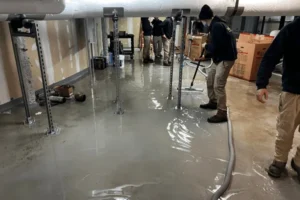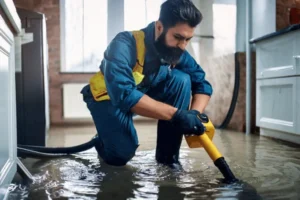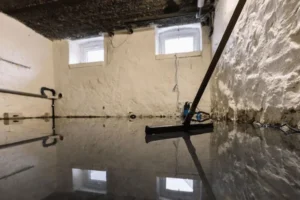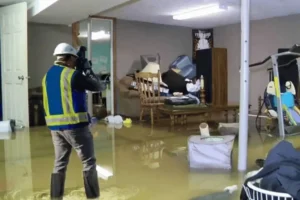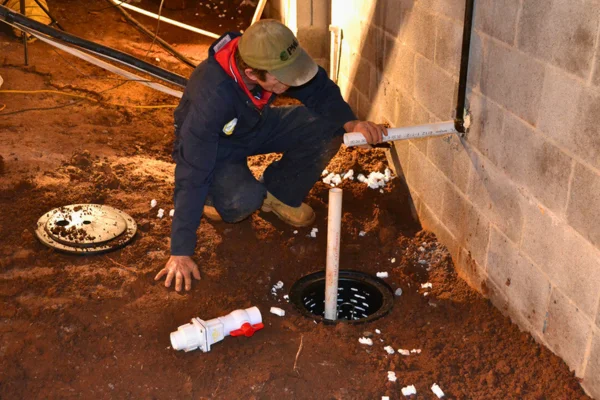When your basement floods, time is of the essence. What might start as a puddle can quickly escalate into serious structural issues, mold growth, and costly repairs. That’s where a water restoration company comes in. These professionals don’t just remove water—they provide a comprehensive approach that includes inspection, water extraction, drying, mold remediation, and long-term prevention.
In this guide, we’ll explore how restoration companies handle flooding repairs from start to finish and why their role is essential to protecting your home and health.
Why Basement Flooding Requires Professional Water Restoration
If your basement floods, taking immediate action is crucial. Delaying the response can lead to hidden water damage and rapid mold growth, both of which pose serious risks. Bringing in professional help right away can prevent costly repairs later and protect your health and home in the long run.
Understanding the Risks of Basement Water Damage
Water damage can be deceiving. While a small amount of water may not look like much, it can quickly seep into drywall, flooring, and structural beams. This creates ideal conditions for mold growth, weakens your home’s foundation, and leads to expensive repairs. Without proper basement water damage repair, minor issues can escalate into severe, long-term problems.
The Importance of Fast Action After Basement Flooding
Water damage worsens with time. The longer standing water sits, the deeper it penetrates surfaces and the harder it becomes to remove. Acting fast minimizes basement flood damage, helps preserve belongings, and reduces restoration costs. Professional water restoration companies are trained to respond quickly, using specialized tools and techniques to limit the extent of damage.
The Dangers of Mold Growth in Wet Basements
Moisture and darkness create the perfect environment for mold in your basement. If not addressed promptly, mold can begin growing within 24 to 48 hours after the flooding occurs. It spreads through the air, impacting indoor air quality, and can cause health problems, including allergies and respiratory issues. A water damage restoration company can stop mold at the source through thorough drying and sanitization.
The Role of a Water Restoration Company in Basement Flooding Repairs
When you call a professional for flooding repairs, you’re getting more than a cleanup crew. These companies follow a detailed process to restore and protect your space entirely.
Initial Damage Assessment and Inspection
As soon as water invades your house, the first step is a thorough inspection. Restoration professionals will:
- Identify the source of flooding (e.g., burst pipe, stormwater, sump pump failure)
- Assess visible and hidden water damage
- Document affected areas for insurance claims
- Determine what materials (drywall, insulation, flooring) need removal or drying
This assessment guides the following steps and ensures no damage is overlooked.
Water Extraction and Drying Solutions
Once the damage is assessed, high-powered pumps and vacuums are used to extract standing water. Industrial-grade air movers and dehumidifiers are then deployed to thoroughly dry the space. These tools are far more effective than standard home equipment, helping prevent further damage and potential mold growth.
Preventing Future Water Damage with Dehumidification
After the basement is dried, humidity levels are closely monitored to ensure they remain stable. If moisture levels remain high, dehumidifiers are used to maintain a dry environment. Additional preventive actions may include:
- Sealing wall and floor cracks
- Improving ventilation
- Installing vapor barriers or drainage systems
These measures reduce the risk of repeat incidents.
Mold Remediation and Sanitization
Once water and moisture are removed, the focus shifts to mold remediation. Restoration teams:
- Remove contaminated materials (drywall, carpet, insulation)
- Apply antimicrobial treatments to prevent regrowth
- Use HEPA vacuums and air scrubbers to remove mold spores from the air
Sanitizing the area is crucial to ensure the space is safe and healthy for future use.
How Water Restoration Companies Ensure Long-Term Basement Protection
The job isn’t done once the basement is dry. Trusted water damage restoration companies go beyond cleanup to protect your house long-term.
Advanced Techniques for Effective Basement Repairs
While dealing with flooding can be overwhelming, restoration companies bring much more to the table than basic cleanup:
- Moisture Mapping: Using infrared imaging to detect hidden water
- Structural Drying: Addressing damage to framing and foundational supports
- Subfloor Inspection: Ensuring water hasn’t compromised flooring or insulation
- Drainage Solutions: Installing or improving sump pumps, French drains, and backflow valves
These steps protect your home from future flooding and create a healthier environment.
Maintaining Healthy Air Quality in Basements
Damp basements don’t just smell bad—they can affect your whole home’s air quality. Restoration experts:
- Use air scrubbers and purifiers to remove pollutants
- Inspect HVAC systems to avoid mold circulation
- Offer ventilation upgrades to support proper airflow
Maintaining indoor air quality is a crucial aspect of basement water damage repair, particularly for homes with young children, seniors, or individuals with respiratory conditions.
Steps to Prevent Basement Flooding in the Future
To prevent future flooding, restoration companies also provide proactive recommendations and services, such as:
- Installing water alarms and sensors
- Cleaning and extending downspouts
- Grading soil away from the foundation
- Waterproofing walls and floors
By investing in these solutions now, you avoid future basement flood damage and protect your investment.
Why You Should Choose a Professional for Basement Flooding Repairs
When it comes to flooding repairs, choosing a professional can save you time and stress.
Expertise and Experience in Water Damage Restoration
Professionals bring industry knowledge, experience, and high-performance equipment. With trained specialists, you’ll benefit from:
- Thorough assessment of damage.
- Advanced equipment for extraction and drying.
- Knowledge of safety protocols to prevent mold.
- Extensive restoration plans tailored to your situation.
They know how to detect hidden damage, ensure safety, and restore your basement more quickly and effectively than a DIY approach.
The Cost of DIY vs Professional Services
Trying to handle flooding repairs on your own might seem like a money-saving move, but it can result in:
- Missed water damage behind walls or under floors
- Incomplete drying that leads to mold
- Long-term structural damage
- Extra costs if professionals have to redo poor repairs
On the other hand, employing professionals guarantees that the task is completed correctly the first time.
Insurance and Claims Assistance for Water Damage
Navigating an insurance claim after flooding can be daunting. Restoration companies can help by:
- Providing detailed documentation of the damage
- Offering itemized repair estimates
- Communicating directly with your insurance adjuster
This support improves your chances of getting your claim approved quickly and thoroughly.
Final Thoughts – Safeguard Your Basement with Professional Restoration
Flooding can strike quickly, but with the proper assistance, recovery can be swift and effective. Water restoration companies play a crucial role in basement flooding repairs by assessing damage, removing water, preventing mold growth, and protecting your space from future issues. Their tools, experience, and proactive solutions make them essential partners in any serious flooding situation.
Basement flooding can escalate quickly. Contact us for an immediate assessment and expert water damage repair services.


